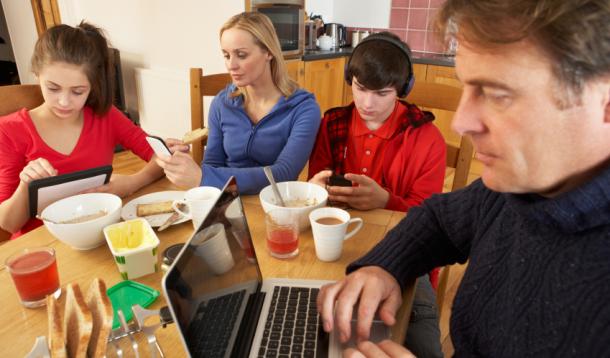
I know it can feel hard to treat our children kindly and put them first when we feel distracted, exhausted or worn down by typical childhood behaviour. However, it is important for parents to understand that the way they treat their children does greatly affect their emotional, intellectual, and even physical development. How parents interact with their children influences who those children are.
This influence can really feel like a burden if parents feel badly about time away from their children or perhaps guilt from continually putting them at the bottom of the priority list. Thankfully it is never too late to consider how we interact with our children, and to do something to positively change that. A good example of this was how a mother’s wish to change her child’s aggressive behaviour led to a change in how she and her husband interacted with their son.
The mom explained to me that her son had become very aggressive and no parenting strategies she was trying were changing that behaviour. After asking questions about their life and family interaction, I discovered that her husband was never around in the mornings and rarely on weekends. When he was home at night, likely because of his intense work life and tiredness, he had one eye one on his phone and was quite sharp with his son. As I expected, bedtime was a constant battle and when his dad was not around, the son would have large tantrums that included hitting.
We had a great conversation (with both mom and dad) about life and their parenting goals. The father actually realized on his own that his schedule and the way he spoke to his son were likely the problem. They realized I could teach them about attachment bridging or strategies to reduce battles but the issue was mostly that the child just really missed his dad. He was trying to express this, but as most young kids don’t have the words to explain their hurt, their communication comes out sideways as shouting or hitting.
These parents made a commitment to use the time they have with their son positively and for dad to find a way to recharge, regroup, and put his phone down so he could come home to his excited son and enjoy some connection time with him.
As I read through a book called HANDS FREE MAMA by Rachel Macy Stafford, I thought about this couple and how we can feel at the mercy of our schedules, desires and mobile devices. It is easy to get caught up in the noise of demands and distractions, whether that noise is originating from our phones or our heads. I marveled at Stafford’s awareness of how her distracted tendencies were causing her to miss out on her children’s lives, and what she did to change that. The part of her book that really had me cheering was about choosing what matters.
Many parents throw their hands up in defeat citing work commitments, laundry piles, and binging phones as the cause of disconnect and relationship trouble with their children. As Stafford describes in her book, parents have a great deal of choice to pick things within their work or home demands that create space for children and themselves. I completely agree with her. For example, we can choose to have the kids help us put the laundry away, not worrying about how it gets folded, or schedule when our phone gets attention, and when it does not.
Stafford writes touching anecdotes of how she chose her children over being busy, instead of being in a hurry and despite the demands of her electronics which will help others to do the same. I like that she admitted how hard this can be, and what can be done to address challenges.
The thing parents and I talk most about when they ask for help is how to put the relationship with their child at the top of the priority list. Children want to feel they matter. They also want adults to respect them and treat them fairly. They do not want to be constantly nagged, shouted at, and ordered around.
Distracted, busy, exhausted parents tend to have a harder time communicating the sense of importance children desire. They also might have a harder time being friendly or hearing their own good parenting wisdom through the noise. As I mentioned above, it is never too late to reconnect with your child – to make space for him or her. If you are interested in learning more about how to do this, I suggest:
- Reading HANDS FREE MAMA
- Taking time to consider your parenting goals
- Engaging in a reflective activity like journaling to write out your needs and challenges
- Talking with a trusted friend or professional about how to make space
- Writing out a schedule which includes time for work, family, chores, fun and exercise
- Popping over to my facebook page where I continually post free parenting resources.

I woke up this morning reminding myself of what to do when exhausted: one son woke me up the first time because he had to pee, the second time with scary dreams and then the other son woke me up at 5:45am because, “my eyes feel funny.” The routine is first to say this mantra until I believe it, “I will not start this day angry.” The next step is to think of one thing I am incredibly grateful for.
Adopting this morning routine became necessary when I realized with the birth of my first child, and even more so with my second, that I was wallowing in self-pity of the things I couldn’t do anymore — and I was blaming my sweet boys for missing those things. I often would start the day with, “I didn’t sign up for this,” after getting up every two hours to feed one and sooth the other. Then I would lay in bed, crying, wishing desperately to just sleep through the night and get out of bed when I’m good and ready, and not when my oldest did at 5am (for a whole year.)
I put my psychotherapist hat on to help myself shift out of this sadness. I realized that thinking of all the things I missed wasn’t helping me. I also remembered that journaling and chatting with others in the same boat was very helpful.
I decided to gather a group of women with young children to have a “letting go” night. I asked everyone to come with a list of all the things that were missed from life before children. Many of the women came with a crayon on construction paper list, already weepy just looking at the words written.
We went around the room reading our lists, which including things like: long, slow mornings with husbands, eating dinner without being interrupted — or going out for dinner, watching movies, enjoying our career or creative pursuits, and having time to do whatever we wanted. Everyone had written, “Enough sleep.”
After we read our list and just sat together in that moment, I asked this question, “What do we need to do in order to let go of these things?” As the women looked at me through tears (I was teary too), I quietly asked because I also wanted to know, “How can we let these go and be okay with the way things are now?”
We started talking about the moments that make parenting amazing like when a baby falls asleep in our arms, feeling his heartbeat and gentle breath. Moments like when your child looks at you and smiles for the first time or says, “I wuv you.”
For me, I remember the days when my two miscarriages occurred. Each time collapsing with grief, as I understood what was happening and that nothing could be done to stop it. In my darkest parenting moments, at my most exhausted, and sleep-deprived state, I remember those two experiences and say to myself, “I am so thankful to have this child keeping me awake right now.”
We all decided to actively stop thinking about the things on the list (I explain a technique I call thought awareness & correction in this post to help with that), and actually ended up ripping our lists up into the tiniest pieces, throwing them enthusiastically around the room. That felt amazing!
It turns out that research supports what we did that night. If you would like to try our letting go process, I suggest following these 5 steps*:
1) Think about what you miss the most and write that down in any way you like. Perhaps use a particular colour or paper that has special meaning to you.
2) Read the list out loud. I know parents who have read their list to their partner or just out loud to themselves.
3) Burn this list (in a safe place) or shred it up into tiny pieces. Watch the fire disintegrate the words or watch the pieces of paper float down after you throw them in the air.
4) Decide to focus on what you CAN do and stop focusing on what you CANNOT do anymore.
5) Each time you feel anger towards your child, remind yourself of what you are grateful for. Actually, gratitude journals are very powerful to improve happiness so thinking of three things you are thankful for each night before falling asleep is a great practice.
*These recommendations are used at your own discretion and do not replace professional help. If you are struggling and need a hand, please seek a trusted counselor or psychotherapist in your area.
If you want some more parenting tips like these, I post free resources/help on my Facebook page.
Photo: Flickr Creative Commons fay.lin